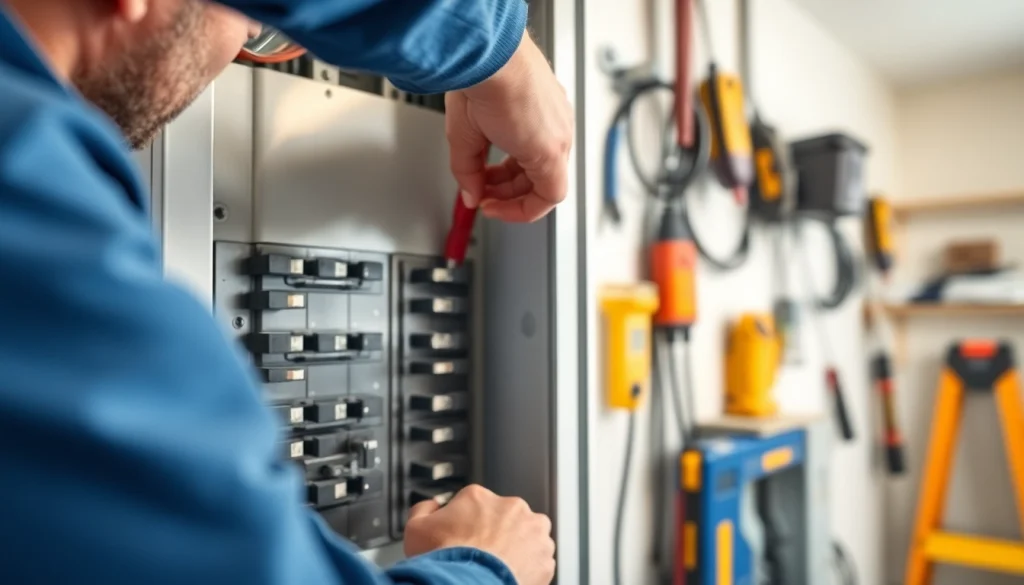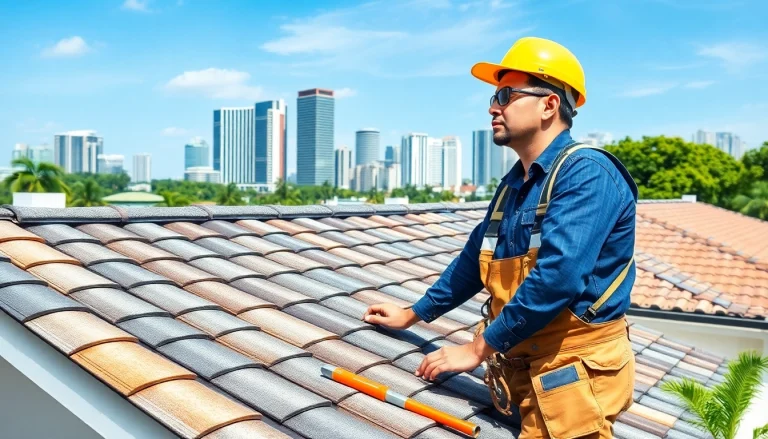
Understanding the Importance of Electrical Panel Upgrades
Upgrading your home’s electrical panel is not just a matter of keeping up with the latest technology; it is a critical aspect of home safety and functionality. As homes evolve with increasing electrical demands—think of energy-intensive appliances and growing reliance on smart technology—the old electrical panels often struggle to keep pace. Consequently, understanding when and how to approach an Electrical Panel Upgrade is crucial for homeowners looking to modernize their living spaces while ensuring safety.
How Electrical Panel Upgrade Enhances Safety
Electrical panels serve as the nerve center for your home’s electrical system. When these panels become outdated or damaged, the risk of electrical fires and system failures increases significantly. Upgrading to a newer model enhances safety in several ways:
- Improved Circuit Breaker Technology: Modern panels use advanced circuit breakers that can better protect against electrical surges and overloads.
- Enhanced Grounding: Newer panels feature improved grounding mechanisms, reducing the risk of serious electrical shock.
- Current Code Compliance: An upgrade ensures your system meets current local and national electrical codes, which have evolved drastically to enhance safety.
Benefits of Upgrading: Capacity and Efficiency
The benefits of upgrading your electrical panel extend beyond safety. Key advantages include:
- Increased Amperage: Higher amperage options, such as 200 amps, allow for the powering of more appliances and devices. This is particularly important as households increasingly rely on electrical solutions for heating, cooling, and electronics.
- Energy Efficiency: Modern panels are designed to be more energy-efficient, helping to lower utility bills while providing reliable power.
- Future-Proofing: With an upgraded panel, your home can accommodate future electrical needs without the hassle of retrofitting.
Identifying Signs Your Panel Needs an Upgrade
Recognizing the signs that your electrical panel is due for an upgrade can prevent potential hazards. Here are some crucial indicators:
- Frequent Circuit Breaker Trips: If your breakers seem to trip often, it’s a sign your panel may be overloaded.
- Buzzing or Crackling Sounds: Unusual noise from your panel can indicate electrical issues that deserve immediate attention.
- Flickering Lights: This is often an indicator that your panel is unable to provide stable power.
- Older Panel Design: If your panel is from the pre-1990s, it might lack the safety and efficiency features of modern designs.
Cost Considerations for Electrical Panel Upgrades
Understanding the cost of an electrical panel upgrade is vital for budgeting and planning. This section will break down the various aspects you should consider.
Average Costs Involved in an Electrical Panel Upgrade
The costs of upgrading an electrical panel can vary significantly based on several factors. Generally, homeowners can expect to pay between $800 and $4,000 for a standard upgrade. Factors influencing this range include:
- Labor Costs: Electricians usually charge between $50 to $120 per hour, depending on their experience and the complexity of the job.
- Panel Costs: The price of the panel itself can range from $100 to $500, with more advanced panels costing more.
- Additional System Enhancements: If additional wiring, outlets, or breakers are needed, expect costs to rise.
Factors Influencing Upgrade Costs
Beyond the average costs, several factors can further influence your final bill:
- Location: Prices can vary depending on regional labor markets and local building codes.
- Panel Size: Larger homes will require larger panels, influencing the cost.
- Permitting Fees: Depending on your locality, permits might be necessary, and their costs should be factored in.
Understanding Rebates and Incentives for Upgrades
Many local governments or utility companies offer programs and incentives for homeowners who upgrade their electrical panels, especially when aligning with energy efficiency goals. These may include:
- Tax Credits: There are often tax credits available for energy-efficient upgrades, which can significantly reduce the cost out-of-pocket.
- Utility Rebates: Contact your utility provider to inquire about any available rebates for electric service upgrades or energy-efficient upgrades.
- Financing Options: Some programs offer low-interest loans specifically for upgrades and energy efficiency improvements.
Steps to Prepare for an Electrical Panel Upgrade
Preparation is key to ensuring a smooth and successful electrical panel upgrade. Here’s a step-by-step guide to help homeowners through the process.
Assessing Your Electrical Needs Before Upgrading
Understanding your current and future electrical needs is vital before undertaking an upgrade. Consider the following:
- Inventory Your Appliances: List major appliances, including HVAC systems, EV chargers, and any planned future additions to your home.
- Calculate Your Electrical Load: Use formulas or consult with a professional to calculate your home’s total electrical load and determine what amperage you’ll need.
- Prioritize Safety: Ensure all your current wiring is up to code and in good condition before proceeding with the upgrade.
Choosing the Right Electrician for Your Upgrade
Finding a qualified electrician is crucial for a safe and efficient upgrade. Key considerations include:
- Licensing and Insurance: Make sure your electrician has the necessary licenses and insurance to perform the work.
- Experience: Look for electricians with proven experience in panel upgrades specifically.
- References and Reviews: Check online reviews and ask for references to gauge past customers’ satisfaction.
Permitting and Regulations for Safe Upgrades
Most areas require permits for electrical work to ensure compliance with local building codes. Here’s what you should know:
- Check Local Requirements: Visit your local government’s website or call the building department to understand the necessary permits for an electrical panel upgrade.
- Safety Inspections: Expect inspections to be part of the permitting process before and after installation.
- Document Everything: Keep clear documentation of all work done and inspections, as this will help protect your investments and aid future repairs or sales.
Common Mistakes to Avoid During an Electrical Panel Upgrade
Despite the importance of upgrading your electrical panel, many homeowners make avoidable mistakes that can lead to increased costs or safety issues. Here’s how to avoid the most common pitfalls:
Neglecting the Planning Stage
Skipping a thorough planning stage can lead to suboptimal outcomes. Homeowners are encouraged to:
- Comprehensive Assessments: Ensure a detailed analysis of existing systems and future needs is completed before starting.
- Clear Communication: Discuss all aspects of the project with the electrician to ensure alignment on expectations and requirements.
Underestimating the Costs of Upgrades
Many homeowners underestimate the cost of an upgrade, leading to budget shortfalls. To avoid this, consider:
- Comprehensive Quotes: Obtain detailed quotes that list all potential costs, including labor, materials, permits, and contingency funds.
- Set a Realistic Budget: Include a buffer for unexpected expenses that may arise during the upgrade process.
Forgetting to Check Local Codes and Standards
Building codes vary significantly by region, and failing to understand local codes can lead to fines or, worse, a hazardous installation. Homeowners should ensure that:
- Compliance is Key: Stay informed about local electrical codes and standards, which can change frequently.
- Consult Professionals: Do not hesitate to hire professionals who know local codes to guide your project.
Long-Term Benefits of Electrical Panel Upgrades
Transitioning to a modern electrical panel offers significant long-term benefits that extend far beyond immediate safety and efficiency improvements. Here’s why investing in this upgrade pays off:
Increased Home Value Through Modernization
Homes equipped with modern electrical systems attract more buyers. Investing in an electrical panel upgrade can:
- Enhance Marketability: Buyers are often reluctant to purchase homes with outdated systems, so improvements can make your home stand out.
- Act as a Selling Point: A modern electrical panel can be a significant selling point in your real estate listing, demonstrating readiness for all contemporary electrical demands.
Improved Energy Efficiency and Lower Bills
In addition to safety and capacity, upgrading your panel can lead to enhanced energy efficiency:
- Efficient Peak Load Management: Advanced panels can help in measuring and managing energy use, potentially lowering your electric bills.
- Seamless Integration with Smart Home Devices: Fully upgraded panels better accommodate smart home technologies, which manage energy use and improve efficiencies.
Future-Proofing Your Home for Electrical Needs
Lastly, a modern electrical panel ensures you are prepared for future technological advancements and increases in electrical demand, such as:
- Electric Vehicle Chargers: With the rise of electric vehicles, upgrading your panel can prepare your home for EV charging stations.
- Renewable Energy Options: If you plan on incorporating solar energy in the future, a new panel is often necessary.
- Enhanced Lifestyle Features: As smart technology continues to expand, your upgraded panel will enable you to take full advantage of these advancements.






